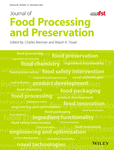Effect of calcium oxide nanoparticles produced from Lavetira critica leaf extract on the freshness of fresh-sliced fruits
Abstract
This study was piloted to assess the fusion of nanoparticles (LCCaNP) from leaf extract of Lavatera critica (LC) and calcium chloride and to observe their impact on the safety of fresh-sliced fruits and extend their shelf life. LCCaNP were synthesized by mixing calcium chloride and LC leaf extract, followed by the addition of sodium hydroxide. The quality of the produced LCCaNP was proven by conducting different physical and chemical tests. Fresh apples, strawberries, and guavas were independently immersed in diverse concentrated LCCaNP and 2% calcium chloride solution for 5 min. These treated sliced fruits were stuffed in polypropylene plastic bags and stored at 5°C. The total soluble solid content (TSS), pH, firmness, and weight reduction rate, 2,2-diphenylpicrylhydrazyl (DPPH), and sensory analysis were conducted for the total storage period of 25 days in a 5-day interval. LCCaNP and calcium chloride were proficient to preserve the fruits for up to 20 days. Our findings showed that LCCaNP-treated fresh-sliced fruits had an improved and enhanced shelf-life than control (nontreated) samples. In conclusion, the leaf of LC is an eventual source for the making of calcium oxide nanoparticles and could serve as an improved food conservation with proficiency to extend the fruit's shelf life for up to 20 days.
Novelty impact statement
For the first time had produced the natural LCCaNP from a natural plant of LC and evaluated its impact on the safety of fresh-sliced fruits. The natural nanosized LCCaNP is successfully produced by using the natural Ayurvedic plant of LC. LCCaNP acted as a better food preservative and had the capability to extend the shelf life of apples, strawberries, and guavas for up to 20 days without causing any side effects.
CONFLICT OF INTEREST
The authors declared no conflict of interest for this article.
Open Research
DATA AVAILABILITY STATEMENT
The data that support the findings of this study are openly available in Veeramani at https://www.researchgate.net/scientific-contributions/Chinnadurai-Veeramani-39715613.




